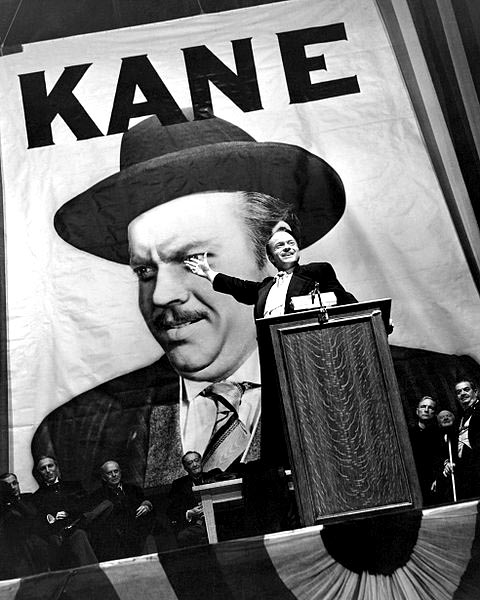 |
| Kane makes a campaign speech (Wikipedia) |
Note: Drama in the 16th century, poetry in the 17th and 18th, and novels in the 19th gave way to film as the most popular "literature" of the 20th century.
Get Ready: Is there something from your childhood--a toy, a pet, a food--that you cherished more than anything else?
A fine example of 20th-century "literature" is Orson Welles's 1941 film Citizen Kane, a "mocumentary" about the life of one Charles Foster Kane, a thinly-disguised character based on the real-life tycoon William Randolph Hearst (amalgamated with a few others).
The story begins with Kane on his deathbed in his mansion, Xanadu (reflecting Hearst's "Castle"). He is holding a snow globe; as he utters his last word, "Rosebud," it falls from his hand and shatters on the floor.
Television was not yet in widespread use in those days, so news was often conveyed through the medium of "newsreels," hastily-made short films shown in theaters before the main attraction. A newsreel producer making Kane's obituary picks up on the word "Rosebud" and tasks one of his reporters, Jerry Thompson, with discovering the word's meaning.
The reporter interviews Kane's friends and business associates. He digs through the archives of Kane's banker, Walter Parks Thatcher, and learns Kane's financial history, including how he became so fabulously rich.
Kane's family was not wealthy, but his mother held the deed to a successful gold mining claim. She hired Thatcher to oversee the proceeds of the claim to ensure Kane's education. While the banker and Kane's parents talk, Kane is happily riding a sled in the snow. As Thatcher attempts to take the boy away, he uses the sled to hit the banker and tries to run away.
At 25, as one of the world's richest men, Kane becomes a newspaper publisher (like Hearst). Thompson continues to learn details of Kane's life from his estranged best friend and his one-time mistress, who became his (now ex-) wife.
In the end, Thompson is unable to complete his assignment: no one knows the significance of "Rosebud." But as the staff cleans out his mansion, they throw Kane's old sled into a furnace. As it catches fire, we see through the camera (but the characters do not) the brand name written on the sled.
Can you guess what it was?
--------Read more: https://en.wikipedia.org/wiki/Citizen_Kane
Practice: Match the term to its definition below:
- amalgamated
- deed
- estranged
- mocumentary
- obituary
- proceeds
- sled
- snow globe
- thinly-disguised
- tycoon
- no longer friendly
- a toy for riding on snow
- rich and powerful person
- a title; an ownership paper
- a "fake" film pretending that it's telling a true story
- profits
- the notice of someone's death, often including a biography
- a water-filled glass ball with a fake snow and a scene inside
- not well hidden
- added together; blended; combined
Answers are in the first comment below.
Submitted to the Shenzhen Daily for February 9, 2021


Answers to the Practice: 1. j; 2. d; 3. a; 4. e; 5. g; 6. f; 7. b; 8. h; 9. i; 10. c
ReplyDelete